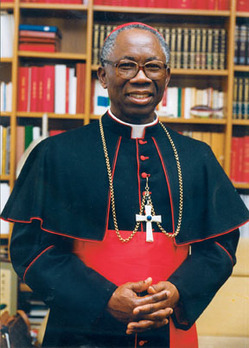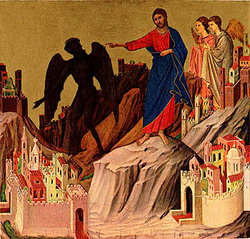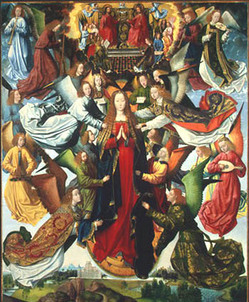 The US Bishops' Committee on Doctrine approved on March 24th and released on the 25th the Guidelines for Evaluating Reiki as an Alternative Therapy. Read the Guidelines for yourself. I suppose this important stuff; I usually look for liturgical heterodoxy and various heretical teachings first...but the bishops have a point. Since I am not a life force, universal or otherwise, I'll throw away my Reiki books.
The US Bishops' Committee on Doctrine approved on March 24th and released on the 25th the Guidelines for Evaluating Reiki as an Alternative Therapy. Read the Guidelines for yourself. I suppose this important stuff; I usually look for liturgical heterodoxy and various heretical teachings first...but the bishops have a point. Since I am not a life force, universal or otherwise, I'll throw away my Reiki books.
Spiritual Life: March 2009 Archives
We know by experience that we have not sufficient strength in ourselves to bring to a successful completion our chief Lenten duty, which is to die fully to sin in order to live fully in the risen Christ. But Christ himself, before leaving his own, prayed to his Father to preserve them from evil and from the evil one (John
He had taught them to ask: lead us not into temptation, but deliver us from evil (Matthew
Fr. Gabriel of St. Mary Magdalen, OCD
Divine Intimacy
 From March 1-7 you won't be seeing too much Vatican activity since many, if not all, of the curial officials (the people who run the various Vatican offices for Pope's apostolic ministry) are making their annual Lenten retreat. This year the retreat is being preached by Francis Cardinal Arinze, prefect emeritus of the Congregation for Divine Worship and the Discipline of the Sacraments on the theme of "The priest encounters Jesus and follows him."
From March 1-7 you won't be seeing too much Vatican activity since many, if not all, of the curial officials (the people who run the various Vatican offices for Pope's apostolic ministry) are making their annual Lenten retreat. This year the retreat is being preached by Francis Cardinal Arinze, prefect emeritus of the Congregation for Divine Worship and the Discipline of the Sacraments on the theme of "The priest encounters Jesus and follows him."
Cardinal Arinze was interviewed by the
Why did you choose this theme for the retreat of the Pope?
Cardinal Francis Arinze: I thought that in the meeting and following of Jesus, we are able to see a summary of all Christianity. On one side there is Jesus who calls us. On the other, we have with us our response: the encounter, so we follow and this becomes a program for life. It was like that for the first apostles: Jesus saw them and told them to follow him. In the following there includes listening to his teaching, miracles, prayer.
We can say that the apostles have completed three years in seminary and the rector was the Son of God. But the call of Jesus is not only for the priests.
Certainly, the reflections that are offered to the Pope are not only for priests but apply to everyone, because Christianity is about the encounter of Jesus with everyone. Everyone can apply it to himself, according to his vocation and mission. And each can give a different answer.
Among the disciples, there were those who immediately left their nets and became his disciples. But there were also those who remained attached to material things, asked for time, and wanted to first return to their loved ones before leaving.
Since then, two thousand years have passed. Can the man of today still meet Jesus?
If you want to, you can meet him, but always two major obstacles must be overcome. The first is superficiality, distraction. And the second is fear. Pontius Pilate is the paradigm of those who are afraid to face the truth. Jesus speaks to him, but he's afraid. He says, "I have come to bear witness to the truth." And Pilate asks, "What is truth?"
But his question is not that of a philosopher who is awaiting the reply. It's one asked without listening, without waiting, without realizing that the truth is right in front of him. Even today many people are missing an appointment with the truth, because they are afraid of what Jesus is and his message. They do not realize that faith is not an obstacle to existence, but a promise of life and truth that goes beyond what is contingent.
Where can this meeting take place?
One of the key places -- not physical but spiritual -- is prayer. Prayer is to leave a space of silence for God, not only externally, but especially internally. You listen. The meditations I am giving the Pope will speak particularly of this, and will remember the long hours of prayer that Jesus spent alone, and will emphasize that the question the disciples asked: "Lord, teach us to pray".
Another meeting place is in scripture: Jesus is the Word of God who became man. Scripture is the written Word of God. When we read the Bible and when we proclaim it during the liturgy, it is God who speaks. The Gospel is not a dusty book of the past. It is the voice of God today.
A third place is the Church, the Mystical Body of Christ. He himself has chosen this as the first pillar, he has given his guarantee that she will always be with you and has promised her the Holy Spirit. In the meditations I will emphasize this dimension: the Church is the Body of Christ, with Christ as the head. This is reflected in the liturgy where we meet Jesus, really and substantially, through Eucharistic communion. It is recognized in charity, especially towards the sick, the elderly, refugees, the poor. Jesus can speak in all these situations. Paul told us that the Church looks at the face of every suffering person and sees Jesus. We do not expect that Jesus will appear, because we are already close to him.
If for the Christian encountering Jesus means to follow Him, what happens when such an attitude of discipleship is missing from the priest?
It is Jesus who gives meaning to the life of the priest. Without him, the priest cannot understand, he no longer makes sense. I would say that his vocation becomes like a farce. For those who, in fact, celebrate, preach, and work?
Of course, it is possible that there are deficiencies in priests. Not all priests have been, and are, saints. The Gospel does not hide the weaknesses and falls of the disciples of Christ. There were those who asked Jesus to set fire to a city of
And then there is Judas Iscariot, who was with Jesus, but didn't love him. He hardened his heart, closed it to him. This demonstrates that the human heart can fail, that the freedom given by God can be misused. In the history of the Church, unfortunately this has happened other times.
Can the penitential dimension of Lent help a priest renew his experience of his encounter with Christ?
Yes, starting with the act of receiving the ashes, which means to accept being sinners. The Church asks to pray a lot during Lent not only as a sign of adoration to God but also to repent of sins committed. It is not enough to receive forgiveness from God, we must also recognize that we have offended the love of God.
And then there is fasting to which the Pope has dedicated his Lenten message. It is today seen just as a gesture, but it should be understood in the proper meaning. Its true meaning is doing something pleasing for others such as sharing goods with the poor.
Solidarity with the suffering is also a way to show the authenticity of our Eucharistic celebration. At the end of Mass the priest says: Go and live what has been celebrated, heard, meditated and prayed. Helping those who are elderly, alone, imprisoned, disabled, is a way to live the Eucharist.
Benedict XVI clearly says this in Deus Caritas Est: If the Eucharist does not translate into works of charity it is fragmented, incomplete.
But shouldn't we still recall the sobriety with which the Pope has re-launched his message of this year?
To fast is to accept that we are sinners. You do without something. It is also a means of spiritual 'training', similar to what athletes practice in order to succeed in a sport.
Then there is the most dynamic dimension, which is precisely that of helping the poor. Spend less and help our brothers who have not: it is the lifestyle advocated by the Pope in his message for World Day of Peace this year. The Christian spirit must go in the opposite direction with respect to unfettered consumerism.
Having beliefs and cabinets that are full -- full of things that often we do not need or use just a few times -- is an insult to the poor.
Today [March 1st] is the First Sunday of Lent, and the Gospel, with the sober and concise style of St. Mark, introduces us to the climate of this liturgical season: "The Spirit drove Jesus out into the desert, and he remained in the desert for 40 days, tempted by Satan" (Mark 1:12). In the
 After having received baptism from John, Jesus enters that empty place, led by the Holy Spirit himself, which had descended upon him, consecrating him and revealing him as the Son of God. In the desert, the place of trial -- as the experience of the people of Israel shows -- there appears the dramatic reality of the "kenosis," the emptying of Christ, who is stripped of the form of God (cf. Philippians 2:6-7). He, who did not sin and cannot sin, submits himself to trial and thus can have compassion for our infirmities (cf. Hebrews
After having received baptism from John, Jesus enters that empty place, led by the Holy Spirit himself, which had descended upon him, consecrating him and revealing him as the Son of God. In the desert, the place of trial -- as the experience of the people of Israel shows -- there appears the dramatic reality of the "kenosis," the emptying of Christ, who is stripped of the form of God (cf. Philippians 2:6-7). He, who did not sin and cannot sin, submits himself to trial and thus can have compassion for our infirmities (cf. Hebrews
In the brevity of the account, in the face of this obscure and darksome figure who dares to
 tempt the Lord, the angels, luminous and mysterious figures, fleetingly appear. The Gospel says that the angels "serve" Jesus (Mark
tempt the Lord, the angels, luminous and mysterious figures, fleetingly appear. The Gospel says that the angels "serve" Jesus (Mark
The angels serve Jesus, who is certainly superior to them, and this dignity of his is proclaimed in a clear though discreet way here in the Gospel. Indeed, even in the situation of extreme poverty and humility, when he is tempted by Satan, he remains the Son of God, the Messiah, the Lord.
 Dear brothers and sisters, we would take away a significant part of the Gospel if we left aside these beings sent by God to announce his presence among us and be a sign of that presence. Let us call upon them often, that they sustain us in the task of following Jesus to the point of identifying ourselves with him. Let us ask them, especially today, to watch over me and my co-workers in the Roman Curia as we begin our retreat this week, as we do every year. Mary, Queen of Angels, pray for us!
Dear brothers and sisters, we would take away a significant part of the Gospel if we left aside these beings sent by God to announce his presence among us and be a sign of that presence. Let us call upon them often, that they sustain us in the task of following Jesus to the point of identifying ourselves with him. Let us ask them, especially today, to watch over me and my co-workers in the Roman Curia as we begin our retreat this week, as we do every year. Mary, Queen of Angels, pray for us!
Pope Benedict XVI
1 March 2009, First Sunday of Lent
St Peter's Square
PS: You may want to read the booklet, "All About Angels" published by the Catholic Information Service.

